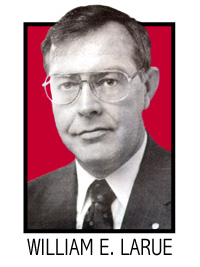 Last month yet
another Labor Day slipped past. There were the
traditional picnics and barbeques, the occasional parade
and the now common doomsday predictions in the media. Last month yet
another Labor Day slipped past. There were the
traditional picnics and barbeques, the occasional parade
and the now common doomsday predictions in the media.
Certainly, there was a little more optimism this year
because of the successful settlement of the Teamsters
strike against the United Parcel Service--a settlement
that saw the Teamsters beat back the rising tide of
part-time work and open the door for 10,000 new full-time
jobs that will offer members higher wage rates, better
benefits and a more secure future.
But the elements that went into this visible, but,
unfortunately, still unusual victory are somewhat unique.
For one thing, though alternative package delivery
systems exist, none were as effective or as inexpensive.
For another thing, UPS delivery men have a personal
connection with the public from their daily rounds. But
the most crucial factor is that the Teamsters were in the
position to shut down the entire operation, because due
to UPS's market share--80 percent--they represented the
bulk of that industry's workers.
The lesson we walk away with from the strike, especially
at the time of the year when we assess the state of the
labor movement is simple and it's not new: unless the
labor movement organizes, it will die. Unless the labor
movement brings in new members, it won't be able to
maintain the 38 percent wage advantage and the benefit
advantage that union membership still represents.
The list of the benefits that have moved from represented
workers to workers at large are vast ... from the 40-hour
workweek to public education to overtime pay to paid
vacations and sick time to health benefits. As we have
seen over the past decade, the advances won by workers
are not set in stone, but instead are under continual
attack by anti-worker forces in Congress and in corporate
America.
Our living standards as a nation are under attack. The
only solution is to organize. AFL-CIO President John
Sweeney has declared that the right to organize is the
civil rights movement of the 1990s. It certainly cuts
across race, gender and economic barriers to the most
basic level of allowing workers and their families the
right to work hard and get ahead.
Workers couldn't do it on their own 100 years ago. Then,
after conditions got better, some have forgotten that
lesson and union membership declined. Now we are facing
that same fight--on organizing--again. The BMWE has made
it a high priority. We face our own, special, challenges
in the rail industry, but though some of the rules are
different, the difficulties and the potential rewards are
the same.
If short line spin-offs aren't organized, our contracts
suffer. If the percentage of union representation keeps
falling while railroads, through mergers, gain in
strength, our contracts suffer. If we don't make a
commitment and stick to it to organize and bring as many
new members in as we can, then all our members will
suffer. And, eventually, the nation and all its workers
will suffer.
We have set a new direction, and we must follow through:
we must organize. |

